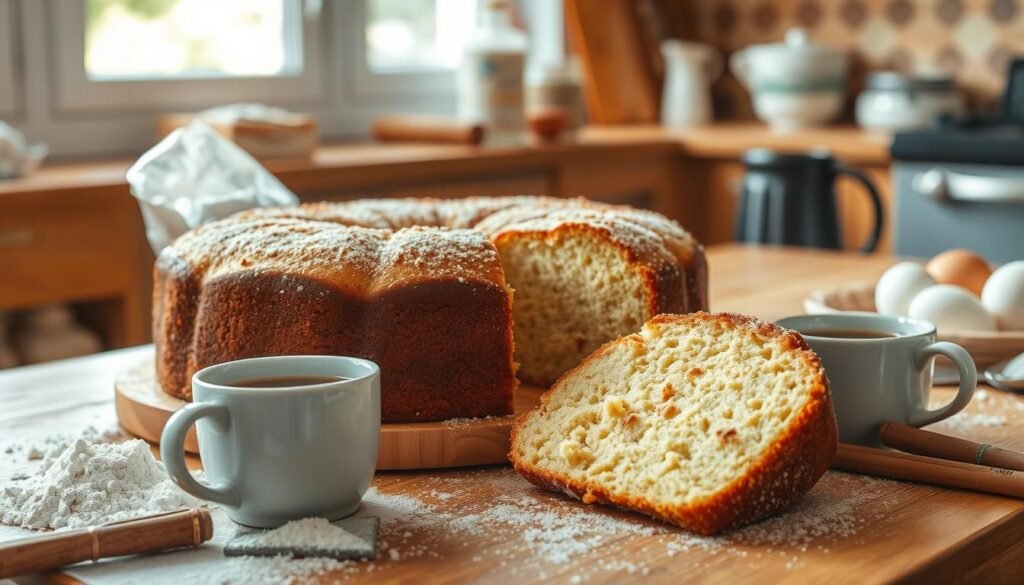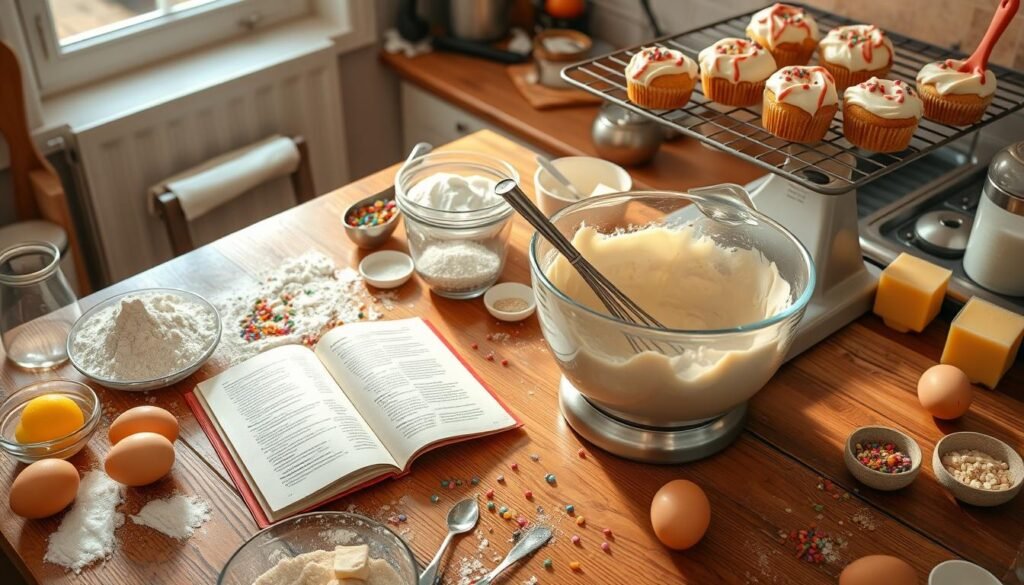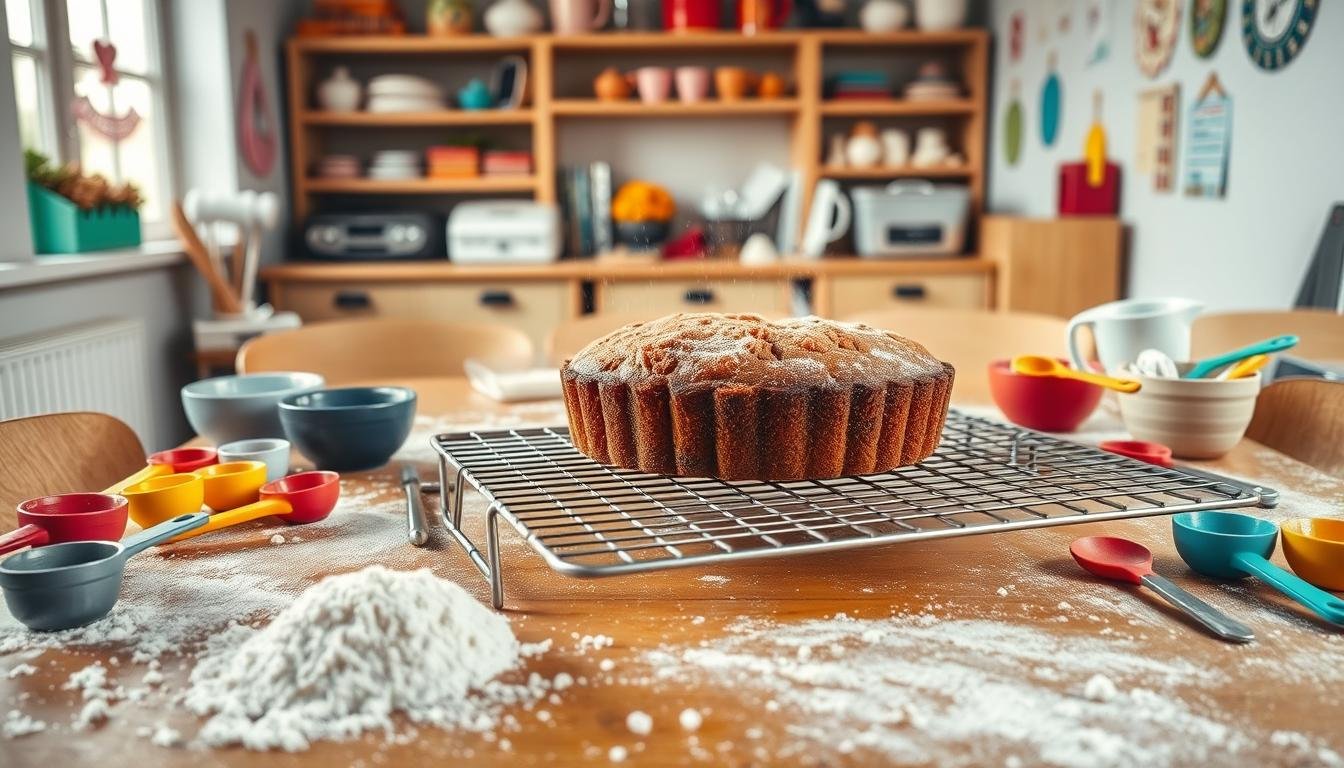The smell of freshly baked cake fills the halls of Mt. Gleason Junior High School’s Home Economics Class Cake Recipe. It brings back fond memories for many former students. They remember learning how to bake and making timeless recipes in those classrooms.
One recipe that has been loved for years is the classic Coffee Cake. It’s a favorite among aspiring home cooks who have learned from their parents and grandparents.
Table of Contents
Introduction to Home Economics Baking Fundamentals
Home economics classes have been a key part of school for a long time. They teach students how to cook and bake. These classes aim to give students the skills they need for everyday life.
History of Home Economics Classes
The start of home economics dates back to the late 19th century. It began as a way to help with the changes brought by industrialization and city growth. Teachers wanted to teach young people, especially women, how to manage a home and care for their families.
Why Baking Skills Matter in Education
Baking skills learned in home economics classes are very valuable. They help students become independent and creative. They also improve problem-solving and nutrition knowledge. By learning to bake, students understand the science of cooking and the need for careful following of recipes.
Essential Kitchen Safety Guidelines
- Proper knife handling and storage
- Maintaining a clean and organized work area
- Adhering to food hygiene practices, such as hand washing and cross-contamination prevention
- Ensuring fire safety and proper use of kitchen appliances
- Understanding the risks associated with hot surfaces and the importance of heat-resistant gloves
By learning these basic baking skills and following kitchen safety rules, students in home economics classes gain important abilities. These skills will help them in their personal and professional lives.
Essential Baking Equipment and Ingredients
Baking is key in the culinary arts. You need the right tools and ingredients for great results. Whether you’re experienced or just starting, knowing what you need can help a lot.
Some baking equipment is crucial. Measuring cups and spoons help you get the right amounts. Mixing bowls, big and small, make mixing easy. And you can’t bake without the right pans, like round cake tins or loaf pans.
Ingredients are also vital. Flour, both all-purpose and cake, is a base for many treats. Sugar adds sweetness and structure. Eggs make things rich and hold ingredients together. Butter and fats add moisture and flavor. And leavening agents like baking powder or baking soda make things light and fluffy.
With the right tools and ingredients, you’ll get better at baking. You can make everything from classic coffee cake to new flavors. The key is to have what you need ready.
“Baking is like washing and folding laundry. You sort, you measure, you mix, you shape, and you wait.” – Anonymous
Understanding Basic Cake Making Techniques
Baking cakes is a fun art that needs precision and knowing different techniques. As you explore baking and dessert recipes in your culinary arts studies, learning these basic methods is key. It will help you make delicious treats.
Proper Measuring Methods
Getting your measurements right is key in baking. Techniques like packing brown sugar, sifting flour, and measuring liquids at eye level are important. These details ensure your cake turns out just right.
Mixing Techniques for Perfect Texture
The way you mix your batter affects the cake’s texture. Different methods, like creaming butter and sugar or mixing dry and wet ingredients separately, can change the texture. Learning these techniques helps you get the perfect softness, fluffiness, or density in your cakes.
Temperature Control Tips
Temperature is crucial in baking. Make sure your oven is preheated correctly and keep the heat steady. This ensures your cake bakes perfectly. Watching the temperature closely and adjusting it helps you get the best results every time.
“Engaging in kitchen chemistry experiments enhances learning experiences for students.”
By mastering these basic techniques, you’ll be on your way to making tasty and beautiful cakes. These will impress your friends, family, and other culinary arts fans.
Home Economics Class Cake Recipe: Classic Coffee Cake
If you went to home economics class, you might remember the classic coffee cake. It’s a treat with a crumbly streusel topping and a moist, buttery inside. It brings back happy memories of baking in school.
The secret to this coffee cake is its simple yet tasty ingredients. The streusel topping has flour, brown sugar, salt, nuts, and butter. It’s sweet and crunchy against the soft cake. The cake uses cake flour, all-purpose flour, sugar, butter, eggs, and sour cream.
This recipe is special because it takes you back to your school days. It’s a chance to relive the joy of baking or to try a classic dessert. Either way, it’s sure to impress and make everyone happy.
Ingredients:
- 2 cups all-purpose flour
- 1 cup cake flour
- 1 cup granulated sugar
- 1 cup unsalted butter, softened
- 4 large eggs
- 1 cup sour cream
- 2 teaspoons baking powder
- 1/2 teaspoon baking soda
- 1/2 teaspoon salt
Streusel Topping:
- 1 cup all-purpose flour
- 1 cup brown sugar
- 1/2 teaspoon salt
- 1/2 cup chopped nuts (such as walnuts or pecans)
- 1/2 cup unsalted butter, cold and cubed
| Ingredient | Amount |
|---|---|
| All-purpose flour | 2 cups |
| Cake flour | 1 cup |
| Granulated sugar | 1 cup |
| Unsalted butter, softened | 1 cup |
| Large eggs | 4 |
| Sour cream | 1 cup |
| Baking powder | 2 teaspoons |
| Baking soda | 1/2 teaspoon |
| Salt | 1/2 teaspoon |
| All-purpose flour (for streusel) | 1 cup |
| Brown sugar (for streusel) | 1 cup |
| Salt (for streusel) | 1/2 teaspoon |
| Chopped nuts (for streusel) | 1/2 cup |
| Unsalted butter, cold and cubed (for streusel) | 1/2 cup |

This classic coffee cake recipe is a timeless treasure. It has a rich history and is loved by many. It’s perfect for making memories or introducing new people to baking. It’s sure to delight everyone and bring a touch of nostalgia to any event.
Step-by-Step Preparation Guide
Baking a classic home economics class cake recipe is fun and rewarding. Let’s go through the steps to make this tasty dessert.
Making the Streusel Topping
Start by making the streusel topping for your cake. Mix 1 cup of all-purpose flour, 1/2 cup of light brown sugar, and a pinch of salt in a bowl. Add 1/2 cup of unsalted butter and mix until crumbly. Then, add 1/2 cup of chopped nuts like walnuts or pecans for extra flavor and texture.
Preparing the Cake Batter
Next, make the cake batter. In a big bowl, mix 1 cup of unsalted butter and 1 cup of granulated sugar until fluffy. Add 2 large eggs one at a time, then 2 teaspoons of vanilla extract. In another bowl, mix 2 cups of all-purpose flour, 1 teaspoon of baking powder, and 1/2 teaspoon of salt.
Alternate adding the dry ingredients and 1 cup of sour cream to the butter-sugar mix. Mix well after each addition but avoid overmixing to keep the cake moist.
Assembly and Baking Instructions
Preheat your oven to 350°F (175°C) and grease a 10-inch Bundt or tube pan. Pour half of the batter into the pan, then sprinkle with half of the streusel topping. Add the rest of the batter and streusel topping on top.
Bake for 40-45 minutes, or until a toothpick in the center comes out clean. Let the cake cool in the pan for 10-15 minutes before flipping it onto a wire rack. Serve and enjoy your homemade cake!

Common Baking Tips and Troubleshooting
Starting your baking journey? Keep these tips and tricks in mind. They’ll help your baking creations come out right every time. Whether you’re a pro or just starting, these culinary arts tips are key.
One key tip is to use room temperature ingredients. This makes them mix well, giving you a smooth texture. Don’t overmix the batter. It can make your baked goods tough. Instead, gently mix ingredients until they’re just combined.
To check if your baked goods are done, use a toothpick. If it comes out clean, they’re ready. Adjust baking times if you’re using different pans than the recipe calls for.
- Experienced bakers might play with fat or sugar levels to their liking. But remember, changing these can change your final product a lot.
- Temperature control is key. Too hot, and the outside will burn before the inside is done. Too cold, and it’ll be dense and undercooked.
- Every oven is different. You might need to tweak baking times and temperatures to get the best results.
With these tips and practice, you’ll soon be making delicious baking treats. You’ll impress everyone with your culinary arts skills.
Decorating and Serving Suggestions
Make your home economics class coffee cake stand out with fun decorating and serving ideas. You can use basic frosting techniques or get creative with garnishes. This way, your dessert will look great and taste amazing.
Basic Cake Decoration Techniques
Begin by spreading a layer of buttercream frosting or powdered sugar on top of your coffee cake. For a fancy look, use a small offset spatula to make swirls or peaks in the frosting. Add a sprinkle of chopped nuts, cinnamon sugar, or fresh berries for extra color and texture.
Storage and Freshness Tips
To keep your cake decorating work looking good, store the coffee cake in an airtight container at room temperature for up to 3 days. If you need to store it longer, refrigerate it. This can keep it fresh for up to 1 week. Before serving, let the cake come to room temperature for the best taste and texture.
With these easy cake decorating tips and storage advice, your coffee cake will be a hit. It will be a beautiful and tasty dessert recipe that shows off your culinary arts skills.
Nutritional Information and Dietary Modifications
The home economics class coffee cake is rich and decadent. It includes butter, sugar, and sour cream. If you want to make it healthier, there are simple changes you can make.
Try adding whole wheat flour to increase the fiber. You can also cut down on sugar by using less or alternative sweeteners like honey. Replacing some butter with applesauce can lower fat and calories without losing the cake’s moistness.
Remember, your dietary needs are unique. The nutritional info here is a guide. Always check with a healthcare professional for personalized advice. With thoughtful changes, you can enjoy the home economics class cake recipe while meeting your dessert recipes and family and consumer sciences needs.
FAQ
What is the history of home economics classes?
Why are baking skills valuable in education?
What are the essential kitchen safety guidelines?
What basic equipment and ingredients are needed for cake baking?
What are the proper measuring techniques in baking?
What is the classic coffee cake recipe from the Mt. Gleason Home Ec. class?
How do you make the streusel topping and prepare the cake batter?
What are some common baking tips and troubleshooting techniques?
How can the coffee cake be decorated and stored?
What are the nutritional considerations for the coffee cake recipe?
Source Links
- https://peacefulcooking.blogspot.com/2013/09/mtgleason-junior-high-home-ec-coffee.html – Mt.Gleason Junior High Home Ec. Coffee Cake
- https://www.semissourian.com/story/2945479.html – Recipes made in home economics class
- https://www.tasteofhome.com/collection/recipes-we-learned-in-home-ec/?srsltid=AfmBOopiScGvs3om2efUCzxdc8bOZ8k7Mcug0uDJw05WbBQkFCp6icDu – 27 Trusty Recipes That We Learned in Home Ec
- https://www.preciouscore.com/perfect-plain-cake/ – Plain Cake Recipe
- https://ormidalels.com/cake-making-for-beginners/ – Cake Making For Beginners – Tom’s Food!
- https://kwgls.wordpress.com/2014/10/27/the-beauty-of-ruggedness-and-irregularitiesrock-cakes-aka-rock-buns-石头蛋糕)/ – The Beauty Of Ruggedness And Irregularities–Rock Cakes aka Rock Buns (石头蛋糕)
- https://www.bbcgoodfood.com/howto/guide/baking-equipment – The ultimate checklist of essential baking equipment, recommended by experts
- https://www.kingarthurbaking.com/blog/2020/04/20/a-family-of-cake-recipes – A family of cake recipes
- https://teachbesideme.com/kitchen-chemistry-cake-experiment/ – Kitchen Chemistry: Cake Experiment
- https://crushmag-online.com/four-basic-baking-methods/ – The 4 Basic Baking Methods | Crush Magazine
- https://www.econlib.org/even-more-valuable-than-her-coffee-cake-recipe/ – Even More Valuable than Her Coffee Cake Recipe – Econlib
- https://toriavey.com/sour-cream-coffeecake-history-recipe/ – Sour Cream Coffeecake
- https://www.tasteofhome.com/collection/classic-cake-recipes-made-from-scratch/?srsltid=AfmBOooHPRPSnPgO6j11Dg6Jml2yyUebsHPKj7FKN6mEup4pGC0vzxo1 – Classic Cake Recipes Made from Scratch
- https://bluehousejournal.blogspot.com/2013/10/modern-home-economics-how-to-bake-cake.html – Modern Home Economics: How To Bake A Cake
- https://www.wikihow.com/Bake-a-Cake – How to Bake a Cake: 3 Delicious Recipes
- https://www.slideshare.net/slideshow/cake-making-68012905/68012905 – Cake Making
- https://shecookswithkids.wordpress.com/tag/cake/ – Cake – She Cooks With Kids
- https://retromummy.com/2016/10/10/help-my-cake-didnt-turn-out-like-the-recipe/ – Help! My cake didn’t turn out like the recipe……
- https://www.food.com/recipe/my-favorite-decorator-cake-icing-143012 – My Favorite Decorator Cake Icing
- https://www.tasteofhome.com/collection/recipes-we-learned-in-home-ec/?srsltid=AfmBOorzoMOuUQpKkNBkcj7alNh3nipYamLPJHLWAsFoyMIrN7bzuMjJ – 27 Trusty Recipes That We Learned in Home Ec
- https://www.beneathmyheart.net/2010/07/wednesdays-with-wanda-7/ – Aunt Rosa Mae’s Angel Food Cake {Wednesdays with Wanda} – Beneath My Heart
- https://www.irishamericanmom.com/irish-sponge-cake/ – Irish Sponge Cake
- https://www.sedgwick.k-state.edu/4-h-youth/documents/Preparing Baked Foods Exhibits for the Fair.pdf – Z:\DOC\FAIR\PREPARING BAKED FOODS EXHIBITS FOR THE FAIR.wpd
- https://blogs.oregonstate.edu/oregonketokids/2016/06/30/chocolate-poundcake/ – Chocolate Poundcake and Nora is 8!

